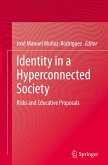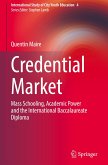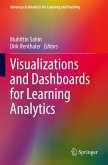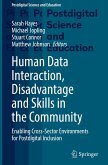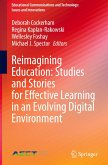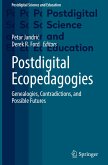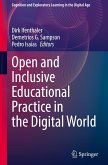Identity in a Hyperconnected Society
Risks and Educative Proposals
Herausgegeben:Muñoz-Rodríguez, José Manuel
Identity in a Hyperconnected Society
Risks and Educative Proposals
Herausgegeben:Muñoz-Rodríguez, José Manuel
- Broschiertes Buch
- Merkliste
- Auf die Merkliste
- Bewerten Bewerten
- Teilen
- Produkt teilen
- Produkterinnerung
- Produkterinnerung
This book is about the formation of identity, primarily in adolescents, and the danger inherent in creating that identity in the context of a hyperconnected world. It provides scientific and regulatory pedagogical knowledge associated with these risks in creating identity, primarily among young people, arising from increasing, and increasingly important, screen connection times. It proposes solutions to the educational challenges of constructing identity in a hyperconnected society. The book focuses especially on the process of identity formation in this instance, where both adolescents and…mehr
Andere Kunden interessierten sich auch für
![Identity in a Hyperconnected Society Identity in a Hyperconnected Society]() Identity in a Hyperconnected Society104,99 €
Identity in a Hyperconnected Society104,99 €![Credential Market Credential Market]() Quentin MaireCredential Market112,99 €
Quentin MaireCredential Market112,99 €![Visualizations and Dashboards for Learning Analytics Visualizations and Dashboards for Learning Analytics]() Visualizations and Dashboards for Learning Analytics104,99 €
Visualizations and Dashboards for Learning Analytics104,99 €![Human Data Interaction, Disadvantage and Skills in the Community Human Data Interaction, Disadvantage and Skills in the Community]() Human Data Interaction, Disadvantage and Skills in the Community104,99 €
Human Data Interaction, Disadvantage and Skills in the Community104,99 €![Reimagining Education: Studies and Stories for Effective Learning in an Evolving Digital Environment Reimagining Education: Studies and Stories for Effective Learning in an Evolving Digital Environment]() Reimagining Education: Studies and Stories for Effective Learning in an Evolving Digital Environment119,99 €
Reimagining Education: Studies and Stories for Effective Learning in an Evolving Digital Environment119,99 €![Postdigital Ecopedagogies Postdigital Ecopedagogies]() Postdigital Ecopedagogies149,79 €
Postdigital Ecopedagogies149,79 €![Open and Inclusive Educational Practice in the Digital World Open and Inclusive Educational Practice in the Digital World]() Open and Inclusive Educational Practice in the Digital World119,99 €
Open and Inclusive Educational Practice in the Digital World119,99 €-
-
-
This book is about the formation of identity, primarily in adolescents, and the danger inherent in creating that identity in the context of a hyperconnected world. It provides scientific and regulatory pedagogical knowledge associated with these risks in creating identity, primarily among young people, arising from increasing, and increasingly important, screen connection times. It proposes solutions to the educational challenges of constructing identity in a hyperconnected society. The book focuses especially on the process of identity formation in this instance, where both adolescents and the adults who teach them have forgotten the vital need to incorporate educational theories and principles, novel, experimental and basic, kn any discussion of adolescent identity work.
Produktdetails
- Produktdetails
- Verlag: Springer / Springer International Publishing / Springer, Berlin
- Artikelnr. des Verlages: 978-3-030-85790-5
- 1st edition 2021
- Seitenzahl: 244
- Erscheinungstermin: 8. Dezember 2022
- Englisch
- Abmessung: 235mm x 155mm x 14mm
- Gewicht: 376g
- ISBN-13: 9783030857905
- ISBN-10: 3030857905
- Artikelnr.: 66386024
- Herstellerkennzeichnung Die Herstellerinformationen sind derzeit nicht verfügbar.
- Verlag: Springer / Springer International Publishing / Springer, Berlin
- Artikelnr. des Verlages: 978-3-030-85790-5
- 1st edition 2021
- Seitenzahl: 244
- Erscheinungstermin: 8. Dezember 2022
- Englisch
- Abmessung: 235mm x 155mm x 14mm
- Gewicht: 376g
- ISBN-13: 9783030857905
- ISBN-10: 3030857905
- Artikelnr.: 66386024
- Herstellerkennzeichnung Die Herstellerinformationen sind derzeit nicht verfügbar.
José Manuel Muñoz-Rodríguez currently serves as Director of the Theory and History of Education Department at the Universidad de Salamanca (Spain). He is Director of Research group "Procesos, espacios y prácticas educativas" (Educational processes, spaces and practices)and Deputy Editor of the Journal Teoría de la Educación. Revista Interuniversitria. He received his PhD in Pedagogy along with an Extraordinary PhD Award. He has published numerous books and book chapters. He has participated in and led research projects, all included in competitive programs: EU, national and regional.I have been director on 6 projects. Dr. Rodriguez has completed research placements, in competitive programmes at prestigious institutions: Universidade degli studi di Genova; Universidade de Coimbra, Université François Rabelais, Salto-youth Iniciatives Resource Centre. Bureau international jeneusse. (Direction Generale Education et Culture de la Commission Europeenne), University of Costa Rica. He is a member of the Spanish Pedagogy Society, EERA (European Educational Research) and WERA (World Educational Research Association) scientific associations.
Part I: Pedagogical, Anthropological, and Political Underpinnings.- Identity Buiding in a Hyperconnected World. Notes for Refuting " Pedagogical Levity"; A. Bernal Guerrero.- The Challenge of Developing one's own Identity in ICT Contexts: The Apparent need to share Everything; A. Sánchez Rojo.- Technological Identity, Educators and Education: A View from Charles Taylor's work; T. Alonso-Sainz.- Digital Natives? Digital Identity Reconstruction Processes and Educational Implications; J. M. Muñoz Rodríguez and A. Dacosta.- Truth in the Hyper-Connected Society: 'Punk' Educational Responses to the Phenomenon of Post-Truth; B. Thoilliez.- Adolescence and Identity in the 21st century. Social media as a Place for Mimesis and Learning; D. Reyero, D. García-Ramos and D. Pattier.- Online Identity Construction in Younger Generations via Identification with Influencers. Potential areas of Vulnerability; B. González Larrea; M. J. Hernández-Serrano and N. M. Morales Romo.- Collaborative DigitalGovernance: Pseudo-educational Identities on the International Political Agenda? Espejo, L. B; Lázaro, L., Álvarez, G. and García-Gutiérrez, J..- Part II: Processes, Practices and Educational Challenges.- Disabled Students in the Digital era. Challenges and Opportunities for Inclusive Schooling; A. Jiménez-Lara and A. Huete-García.- Connectivity's Influence on Emotional Management in Adolescence; P. Torrijos Fincias, S. Serrate González and J. MartinLucas.- Hyperconnected Identities and Relationships in Education from an Intercultural Viewpoint; E. Vila Merino and V. E. Álvarez Jiménez.- Social Media and their Influence on Gender Identity Building: A Study of the Parental role in Adolescence; G. Parra Nieto, J. Ruedas Caletrio, and S. Serrate González.- The Invisible Learning of Children in Social Networks. Promoting safe habits and Environments; R. Campos Ortuño, P. Renés-Arellano and M. J. Hernández-Serrano.- Do Avatars Dream of Digital Lynxes? From too little Nature to too much Technology; R. De Tapia Martí and M. Salvado Muñoz.- A Hyperconnected University Identity: Hazards and Advantages; F. Esteban Bara.
Part I: Pedagogical, Anthropological, and Political Underpinnings.- Identity Buiding in a Hyperconnected World. Notes for Refuting " Pedagogical Levity"; A. Bernal Guerrero.- The Challenge of Developing one's own Identity in ICT Contexts: The Apparent need to share Everything; A. Sánchez Rojo.- Technological Identity, Educators and Education: A View from Charles Taylor's work; T. Alonso-Sainz.- Digital Natives? Digital Identity Reconstruction Processes and Educational Implications; J. M. Muñoz Rodríguez and A. Dacosta.- Truth in the Hyper-Connected Society: 'Punk' Educational Responses to the Phenomenon of Post-Truth; B. Thoilliez.- Adolescence and Identity in the 21st century. Social media as a Place for Mimesis and Learning; D. Reyero, D. García-Ramos and D. Pattier.- Online Identity Construction in Younger Generations via Identification with Influencers. Potential areas of Vulnerability; B. González Larrea; M. J. Hernández-Serrano and N. M. Morales Romo.- Collaborative DigitalGovernance: Pseudo-educational Identities on the International Political Agenda? Espejo, L. B; Lázaro, L., Álvarez, G. and García-Gutiérrez, J..- Part II: Processes, Practices and Educational Challenges.- Disabled Students in the Digital era. Challenges and Opportunities for Inclusive Schooling; A. Jiménez-Lara and A. Huete-García.- Connectivity's Influence on Emotional Management in Adolescence; P. Torrijos Fincias, S. Serrate González and J. MartinLucas.- Hyperconnected Identities and Relationships in Education from an Intercultural Viewpoint; E. Vila Merino and V. E. Álvarez Jiménez.- Social Media and their Influence on Gender Identity Building: A Study of the Parental role in Adolescence; G. Parra Nieto, J. Ruedas Caletrio, and S. Serrate González.- The Invisible Learning of Children in Social Networks. Promoting safe habits and Environments; R. Campos Ortuño, P. Renés-Arellano and M. J. Hernández-Serrano.- Do Avatars Dream of Digital Lynxes? From too little Nature to too much Technology; R. De Tapia Martí and M. Salvado Muñoz.- A Hyperconnected University Identity: Hazards and Advantages; F. Esteban Bara.


